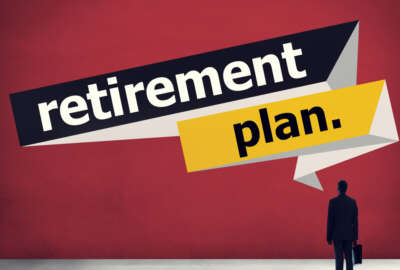Federal retirees especially have to pay attention to their debt profiles
Not all debt is evil if you manage it correctly. Retired federal manager Abe Grungold of AG Financial Services offers advice.
What’s the old saying? Never a lender nor debtor be? For most of us, no problem not being a lender. But for buying a house or a car — that entails taking on debt for the average working stiff. Not all debt is evil if you manage it correctly. Retired federal manager Abe Grungold of AG Financial Services joined the Federal Drive with Tom Temin with some advice.
Interview Transcript:
Tom Temin And people retire even with debt and people carry debt and the debt levels if you look at it nationally Abe. It’s not a pretty picture, is it?
Abe Grungold In preparation for today, I looked up some statistics, and the numbers were just staggering. For credit card debt. There is $1.1 trillion of credit card debt, and that pertains to 49% of all credit card holders. And with respect to mortgage debt, there’s $12.2 trillion in home mortgage debt. And that is for 70% of all households. That number made a little bit more sense to me. But if you are a federal employee, and I remember this early on in my career, that when I first got the job with the government, I was a GS-9, and I immediately started looking to buy my own home. And I realized something very important that with my mortgage and my other expenses, I wanted to make sure that I was going to be able to contribute to the TSP as much as I could afford to do. And what I learned was I needed to put my money in the TSP first before I paid my other bills. It’s very important if you are an active federal employee or a young federal employee is to pay yourself first, and you must at least put in 5% of your salary in the TSP so you can receive the government match of 5%. You have to do that at a minimum. And I heard a statistic recently, I think there’s about 85% of all federal employees who are at least putting in 5%. So, there are some active employees who cannot meet the 5% because they are possibly in a very expensive city like New York or San Francisco, or they just feel it financially cannot do it. So, this is very important, very important to pay yourself first and to put in as much as you can afford.
Tom Temin You know when I started out. People were content almost to be house poor. And the reason was real estate values just went up and up and up in the 70s, 80s, 90s, you know. Well, till they didn’t. Now they’re going up again in most places, but it’s not a guaranteed thing. I think the thinking now is, you know, maybe don’t be house poor, but live in what you can afford comfortably again. So, you can do some of those other things for your long-term financial benefit. Now, like you say, investing in your 401 K or your TSP. What’s your thinking on house poor and housing cost?
Abe Grungold This is an excellent question, Tom. When I first was a federal employee, I was a GS-9 and I was looking for a condominium, and I was single at the time. And I wanted this two-bedroom condominium, and I couldn’t afford it Tom. I could not afford it. So, I ended up buying a one bedroom in the same building. And I said, you know, as my federal career advances, I will be able to afford a bigger home. But right now, I need to buy what I can afford. And I ended up buying the one bedroom. I owned it for ten years, and then later on I did buy the two bedroom, and then later on I bought a home and etc. etc.. So, you really need to be realistic with buying what you can afford. That’s the most important thing. But before you buy something, you have to factor in your contribution to your retirement. That has to be part of your budget, and you need to think about that immediately as a new federal employee. To start right away contributing.
Tom Temin And if you are making comfortable, say, mortgage payments and you are headed to the retirement end of things, a lot of people psychologically say, I got to get rid of my mortgage, sell the house, buy something less, whatever the case might be, or sell the house or pay it off. That’s not necessarily the right knee jerk thing to do, though, is it?
Abe Grungold Well, certainly if you can afford to pay your mortgage, while you are in the latter part of your federal career, it’s okay to carry that mortgage with you into retirement. If you are doing your calculations properly, you have at least, 80%, retirement income stream from your salary going into retirement. That’s fine. That’s fine. But what happens is a lot of people, when they get into retirement, they tend to spend more. And I see it, you know, in my own neighborhood, I live in a retirement community, and my friends and neighbors are spending like crazy. They’re going on, you know, trips, and they have their grandchildren over a lot, and they’re buying motorcycles and they’re buying a boat. And that’s fine, too, if you can afford to do all those things, if your budget doesn’t allow for that, your retirement is not going to be what you expect it to be Tom. And there is a possibility that you are just creating more debt in retirement, and you may have to end up getting a part time job to supplement your income. It’s always wonderful to go into retirement with no debt, but if you do have some, you certainly have the budget for that before you put in your retirement papers.
Tom Temin But it could be that the mortgage tax deduction, you know, is a factor that would weigh in favor of maybe not paying off the mortgage. Again, if the mortgage is a reasonable piece of your income, even in retirement. Yes. I always tell my clients to continue paying their, mortgage into retirement. But most important, try to maximize your contribution to the TSP before retirement. Try to build up that retirement, nest egg as much as you can before you actually go out the door. And I remember I had two months left, in the beginning of the year in which I retired, and I was doubling my payments to the TSP every paid period because I knew I was leaving at two months. I wanted to put in the absolute maximum that I could.
Tom Temin And what about credit card debt? Because that’s a really tough thing, people. We just use cards now. You can’t even. They’re places that don’t even take cash. We’ve got an expensive coffee shop, you know, near our studios. And for a little tiny, it looks like a teacup. Teensy little cup of cappuccino. They want seven bucks. They don’t take cash. You’ve got to use a credit card.
Abe Grungold That’s true. Many retail places just do not take cash. And I have found myself lately using a credit card wherever I go. But the most important thing about your credit card is you have to pay it off at the end of the month. Because if you’re not doing that, you’re spending 13 to 18% in interest on that money that you have spent on coffee and, going to, you know, McDonald’s or wherever you went. And really, you should not be spending that extra money, Tom. You shouldn’t spend that extra money. It’s okay to use a credit card, but you have to know and understand, I have to pay this off at the end of the month. My daughter is learning this now at the age of 22. So, it’s a life skill that that everyone has to work on every day. It’s so easy to give them the card, swipe it. It’s painless, but it’s something that has to be built into your DNA.
Copyright © 2025 Federal News Network. All rights reserved. This website is not intended for users located within the European Economic Area.
Tom Temin is host of the Federal Drive and has been providing insight on federal technology and management issues for more than 30 years.
Follow @tteminWFED






